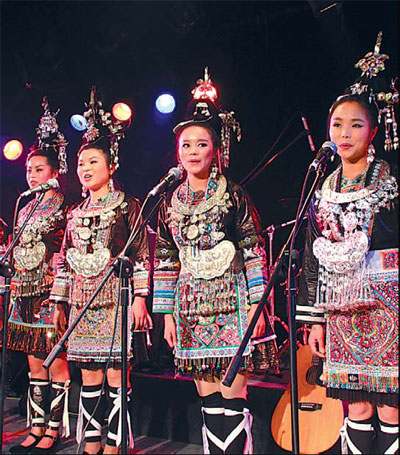
 |
|
Singers from Guizhou province perform the Grand Song of the Dong people in Beijing. Photos by He Junsong / For China Daily |
A series of Dong ethnic group folk music concerts has attracted considerable attention in Beijing. It is not the first time that such music has been heard here, but it is rare to see a group of grassroots musicians from the countryside present their music on their own in the capital.
These musicians from Liping, Guizhou province performed the Grand Song of the Dong people, a kind of a cappella production that was proclaimed by UNESCO as a masterpiece of Intangible Cultural Heritage of Humanity in 2009.
Neither sponsored by the government nor invited by any organization to promote intangible cultural heritage, the Grand Song choir simply came to Beijing in the hope of making a living by their music.
Through years of education about cultural preservation, we have gotten used to seeing traditional music only as a form of "heritage" that needs to be safeguarded -until the Dong musicians reminded us their music is very much a living thing.
The Dong people, who don't have a written language of their own, transmit much of their history, culture and knowledge through song. These songs accompany Dong people throughout their lives, and choirs of children, young and senior people are formed in every village.
Five years ago, I traveled to Liping and had a chance to hear grand songs in their original environment. At a drum tower, a meeting place found in every Dong village, young men and women formed different teams and sang antiphonal songs with polyphonic lines. Their voices echoed throughout the mountain, mixed with the sounds of the river and the chirping of birds and insects.
That was an unforgettable moment. Hearing the Dongs' grand songs again revived my memories, although the environment of a Beijing rock club is not as poetic.
 |
|
The Dong writer and rock singer Wu Hongfei plays with the Dong choir. |
I feel lucky to have listened to the choir in Beijing because such groups have become rarer, even in Guizhou these days, as most Dong youths have left home to find jobs as factory workers in the economically developed Zhejiang and Guangdong provinces. For farmers in Guizhou, one of the poorest provinces in China, this is usually the only way to pursue better lives.
Among the singers I met five years ago was Wu Jinyan, a young woman who would become the leader of today's Dong choir in Beijing. Like many of her ilk, Wu experienced working in factories in Guangdong. But she has always liked singing traditional folk songs and didn't want to give it up.
With the help of Wu Hongfei, a Dong writer and rock singer in Beijing, Wu Jinyan and her friends embarked on their journey to the capital. They have given four concerts in Beijing in about a month and enthralled many people who had never heard the grand songs before. Through selling tickets, the musicians also made money.
The Dong choir in Beijing represents a kind of "bottom-up" effort to promote traditional culture, which is crucial to the safeguarding of intangible cultural heritage. Only when traditional culture helps people to live more affluent and dignified lives will it be really safeguarded.
We are used to "top-down" projects salvaging traditional culture. But unless they work on a more personal level, such efforts are not always effective. For example, research institutes have recorded thousands of hours of folk music, but they are available only to professionals, not the public. A concert is often more effective in promoting music than an academic thesis.
But there are not many such concerts. If you want to hear authentic Chinese folk music, you often have to travel to their places of origin. That's why I went to Guizhou to hear the grand songs, but not everybody has the chance to travel that far. Most people will never be able to hear the grand songs if the Dong musicians don't come to perform in Beijing.
Another reason I appreciate the Dong musicians' work is that they have started a kind of "fair trade" in music. Unlike many ethnic singers and dancers employed by travel agencies to entertain tourists, they have come directly to audiences to present their own culture, and have control of their own programming and income.
After four concerts, the choir decided to stay in Beijing to continue performing Dong folk music. They will have to find other jobs to support themselves until they become professional artists, but they are creating new possibilities for their country folk other than working on assembly lines.
I hope more traditional folk musicians will bring their music to big cities. In doing so, they are safeguarding their cultural heritage and making cities more colorful.
muqian@chinadaily.com.cn